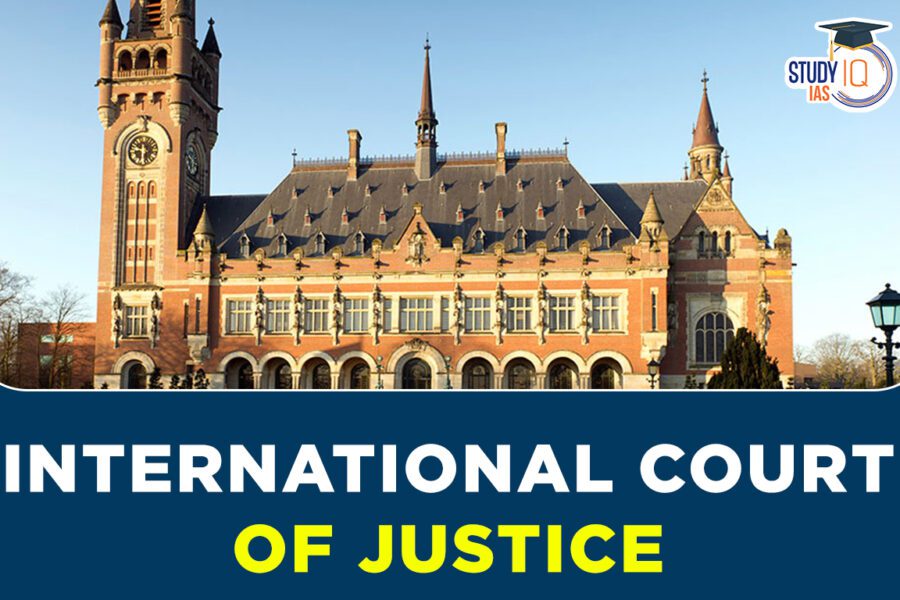Introduction
The International Court of Justice (ICJ), established in 1945 under the Charter of the United Nations, stands as the principal judicial organ of the international community. Headquartered at The Hague, the ICJ functions as the guardian of international law and is entrusted with the peaceful resolution of disputes between states. In an increasingly interconnected world where disputes transcend borders, the ICJ plays a pivotal role in maintaining global order, ensuring respect for international legal principles, and fostering a culture of peaceful settlement of disputes. Its role has evolved significantly since its establishment, reflecting the challenges of modern international relations and the demands of a complex global legal order.
The ICJ exercises a dual mandate: the settlement of contentious cases between states and the issuance of advisory opinions on legal questions referred by United Nations organs and specialized agencies. In its contentious jurisdiction, only states may be parties before the Court, thereby reinforcing the principle of sovereign equality. The Court adjudicates disputes relating to territorial sovereignty, maritime boundaries, diplomatic relations, economic rights, non-use of force, and breaches of international treaties. Landmark judgments, such as the Nicaragua v. United States (1986) case on the use of force, the North Sea Continental Shelf cases (1969) on maritime delimitation, and the Bosnian Genocide case (2007), have not only resolved disputes but also shaped the contours of customary international law and reinforced norms essential to the maintenance of international peace and security.
In its advisory capacity, the ICJ assists the United Nations and its agencies by clarifying legal uncertainties on matters of international concern. Although advisory opinions are non-binding, they carry substantial persuasive authority and moral weight, often guiding the conduct of states and the decision-making of international institutions. The Advisory Opinion on the Legality of the Threat or Use of Nuclear Weapons (1996) and the Kosovo Advisory Opinion (2010) illustrate how the Court contributes to the progressive development of international law and provides legitimacy to global governance.
The International Court of Justice (ICJ) plays a vital role in global dispute settlement by providing a platform for countries to resolve their disputes peacefully. Here’s how the ICJ contributes to global peace and stability.
– Settling Disputes between States: The ICJ settles disputes between countries based on international law, treaties, and customary international practices. Its decisions are binding and contribute to the development of international law.
– Providing Advisory Opinions: The ICJ offers advisory opinions on legal issues referred to it by authorized United Nations organs. These opinions provide guidance on complex legal matters and help shape international law.
– Promoting Peaceful Resolution: By resolving disputes through legal channels, the ICJ prevents conflict escalation and promotes peaceful resolution. Its judgments reinforce the principle that disputes can be settled without resorting to force.
– Developing International Law: The ICJ’s decisions contribute to the development of international law, setting precedents for future cases and shaping global legal norms.
The Court’s role in global dispute settlement, however, is not without limitations. Its jurisdiction is based on the consent of states, whether through special agreements, optional clause declarations, or compromissory clauses in treaties. Many powerful states, including some permanent members of the Security Council, have been reluctant to accept the Court’s compulsory jurisdiction, thereby weakening its universality. Moreover, the enforcement of ICJ judgments relies heavily on voluntary compliance or, in rare cases, the intervention of the Security Council. This dependence creates a structural weakness, particularly when geopolitical interests of major powers conflict with adherence to judicial decisions.
Despite these challenges, the ICJ continues to function as a vital forum for the peaceful resolution of disputes. The increasing number of cases brought before the Court in recent decades reflects growing confidence in its impartiality and expertise. For smaller and less powerful states, the ICJ provides a neutral and authoritative platform to assert rights under international law against stronger adversaries, thereby promoting the principle of equality among nations. Its jurisprudence has enriched international law by crystallizing customary norms, interpreting treaty provisions, and balancing competing claims of sovereignty and global interest.
The contemporary role of the ICJ is also significant in light of global challenges such as climate change, transboundary environmental disputes, cyber operations, and the use of force in non-traditional contexts. Recently, several states and international organizations have sought advisory opinions from the Court on matters relating to climate obligations and state responsibility for transboundary harm, indicating a growing reliance on the ICJ to provide legal clarity on pressing global issues. Such developments highlight the Court’s potential in shaping the legal framework for emerging challenges, thereby reinforcing its relevance in the twenty-first century.
In conclusion, the International Court of Justice occupies a central place in the architecture of international dispute settlement. It symbolizes the triumph of law over force and embodies the commitment of the international community to resolve disputes through reasoned adjudication rather than coercion. While jurisdictional and enforcement limitations remain persistent challenges, the ICJ’s jurisprudence, authority, and moral influence cannot be understated. Its role in settling disputes, clarifying legal principles, and fostering respect for international law continues to be indispensable in promoting peace, stability, and justice in an increasingly complex world. The future effectiveness of the ICJ will, however, depend on the willingness of states to submit themselves to its jurisdiction and to respect the binding force of its decisions, thereby reinforcing the rule of law at the international level.
Contributed by Shruti ( Intern )

